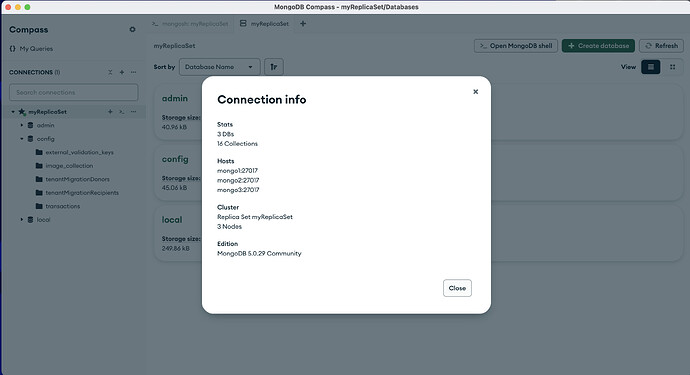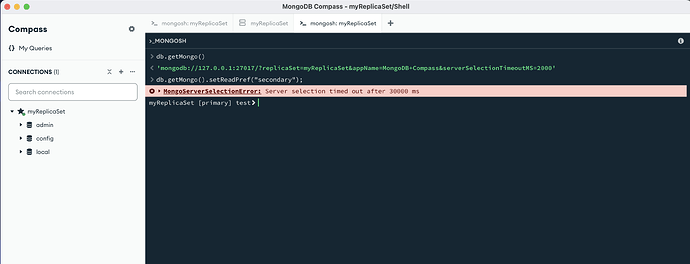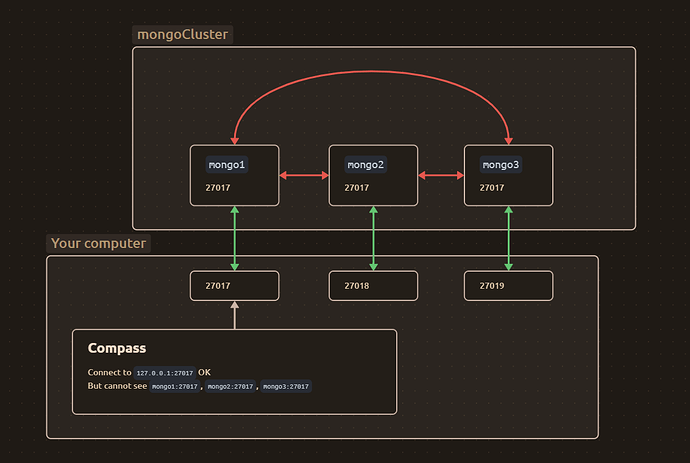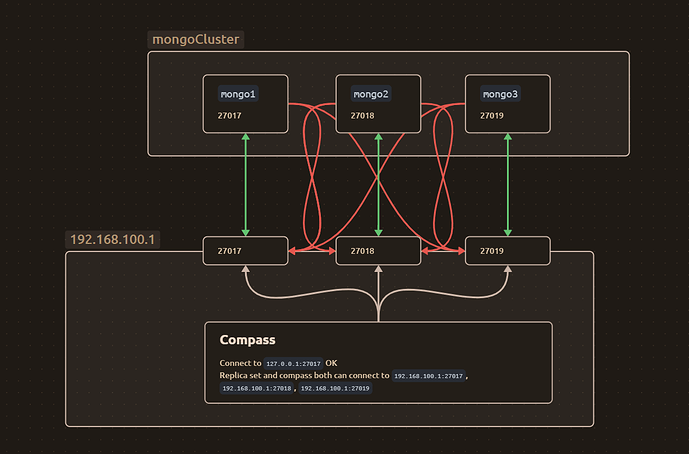HI,
I am following the documentation at Deploying A MongoDB Cluster With Docker | MongoDB
in a mac system running nerdctl as command line client to connect to containerd runtime.
I am able to complete the setup properly and connect to the database from compass.
But when I try to set the read preference as secondary, it just times out.
rjohn@FIVE9-DYFPDQ0WXH ~ % lima nerdctl exec -it mongo1 mongosh --eval "rs.status()"
{
set: 'myReplicaSet',
date: ISODate('2024-10-11T03:45:07.595Z'),
myState: 1,
term: Long('1'),
syncSourceHost: '',
syncSourceId: -1,
heartbeatIntervalMillis: Long('2000'),
majorityVoteCount: 2,
writeMajorityCount: 2,
votingMembersCount: 3,
writableVotingMembersCount: 3,
optimes: {
lastCommittedOpTime: { ts: Timestamp({ t: 1728618307, i: 1 }), t: Long('1') },
lastCommittedWallTime: ISODate('2024-10-11T03:45:07.056Z'),
readConcernMajorityOpTime: { ts: Timestamp({ t: 1728618307, i: 1 }), t: Long('1') },
appliedOpTime: { ts: Timestamp({ t: 1728618307, i: 1 }), t: Long('1') },
durableOpTime: { ts: Timestamp({ t: 1728618307, i: 1 }), t: Long('1') },
lastAppliedWallTime: ISODate('2024-10-11T03:45:07.056Z'),
lastDurableWallTime: ISODate('2024-10-11T03:45:07.056Z')
},
lastStableRecoveryTimestamp: Timestamp({ t: 1728618287, i: 1 }),
electionCandidateMetrics: {
lastElectionReason: 'electionTimeout',
lastElectionDate: ISODate('2024-10-11T03:30:06.905Z'),
electionTerm: Long('1'),
lastCommittedOpTimeAtElection: { ts: Timestamp({ t: 1728617396, i: 1 }), t: Long('-1') },
lastSeenOpTimeAtElection: { ts: Timestamp({ t: 1728617396, i: 1 }), t: Long('-1') },
numVotesNeeded: 2,
priorityAtElection: 1,
electionTimeoutMillis: Long('10000'),
numCatchUpOps: Long('0'),
newTermStartDate: ISODate('2024-10-11T03:30:06.954Z'),
wMajorityWriteAvailabilityDate: ISODate('2024-10-11T03:30:08.126Z')
},
members: [
{
_id: 0,
name: 'mongo1:27017',
health: 1,
state: 1,
stateStr: 'PRIMARY',
uptime: 947,
optime: { ts: Timestamp({ t: 1728618307, i: 1 }), t: Long('1') },
optimeDate: ISODate('2024-10-11T03:45:07.000Z'),
lastAppliedWallTime: ISODate('2024-10-11T03:45:07.056Z'),
lastDurableWallTime: ISODate('2024-10-11T03:45:07.056Z'),
syncSourceHost: '',
syncSourceId: -1,
infoMessage: '',
electionTime: Timestamp({ t: 1728617406, i: 1 }),
electionDate: ISODate('2024-10-11T03:30:06.000Z'),
configVersion: 1,
configTerm: 1,
self: true,
lastHeartbeatMessage: ''
},
{
_id: 1,
name: 'mongo2:27017',
health: 1,
state: 2,
stateStr: 'SECONDARY',
uptime: 911,
optime: { ts: Timestamp({ t: 1728618297, i: 1 }), t: Long('1') },
optimeDurable: { ts: Timestamp({ t: 1728618297, i: 1 }), t: Long('1') },
optimeDate: ISODate('2024-10-11T03:44:57.000Z'),
optimeDurableDate: ISODate('2024-10-11T03:44:57.000Z'),
lastAppliedWallTime: ISODate('2024-10-11T03:45:07.056Z'),
lastDurableWallTime: ISODate('2024-10-11T03:45:07.056Z'),
lastHeartbeat: ISODate('2024-10-11T03:45:05.956Z'),
lastHeartbeatRecv: ISODate('2024-10-11T03:45:07.189Z'),
pingMs: Long('0'),
lastHeartbeatMessage: '',
syncSourceHost: 'mongo1:27017',
syncSourceId: 0,
infoMessage: '',
configVersion: 1,
configTerm: 1
},
{
_id: 2,
name: 'mongo3:27017',
health: 1,
state: 2,
stateStr: 'SECONDARY',
uptime: 911,
optime: { ts: Timestamp({ t: 1728618297, i: 1 }), t: Long('1') },
optimeDurable: { ts: Timestamp({ t: 1728618297, i: 1 }), t: Long('1') },
optimeDate: ISODate('2024-10-11T03:44:57.000Z'),
optimeDurableDate: ISODate('2024-10-11T03:44:57.000Z'),
lastAppliedWallTime: ISODate('2024-10-11T03:45:07.056Z'),
lastDurableWallTime: ISODate('2024-10-11T03:45:07.056Z'),
lastHeartbeat: ISODate('2024-10-11T03:45:05.957Z'),
lastHeartbeatRecv: ISODate('2024-10-11T03:45:07.189Z'),
pingMs: Long('0'),
lastHeartbeatMessage: '',
syncSourceHost: 'mongo1:27017',
syncSourceId: 0,
infoMessage: '',
configVersion: 1,
configTerm: 1
}
],
ok: 1,
'$clusterTime': {
clusterTime: Timestamp({ t: 1728618307, i: 1 }),
signature: {
hash: Binary.createFromBase64('AAAAAAAAAAAAAAAAAAAAAAAAAAA=', 0),
keyId: Long('0')
}
},
operationTime: Timestamp({ t: 1728618307, i: 1 })
}
when I try setReadPref(“secondary”), it just times out.
Could you please tell me where I am going wrong.



